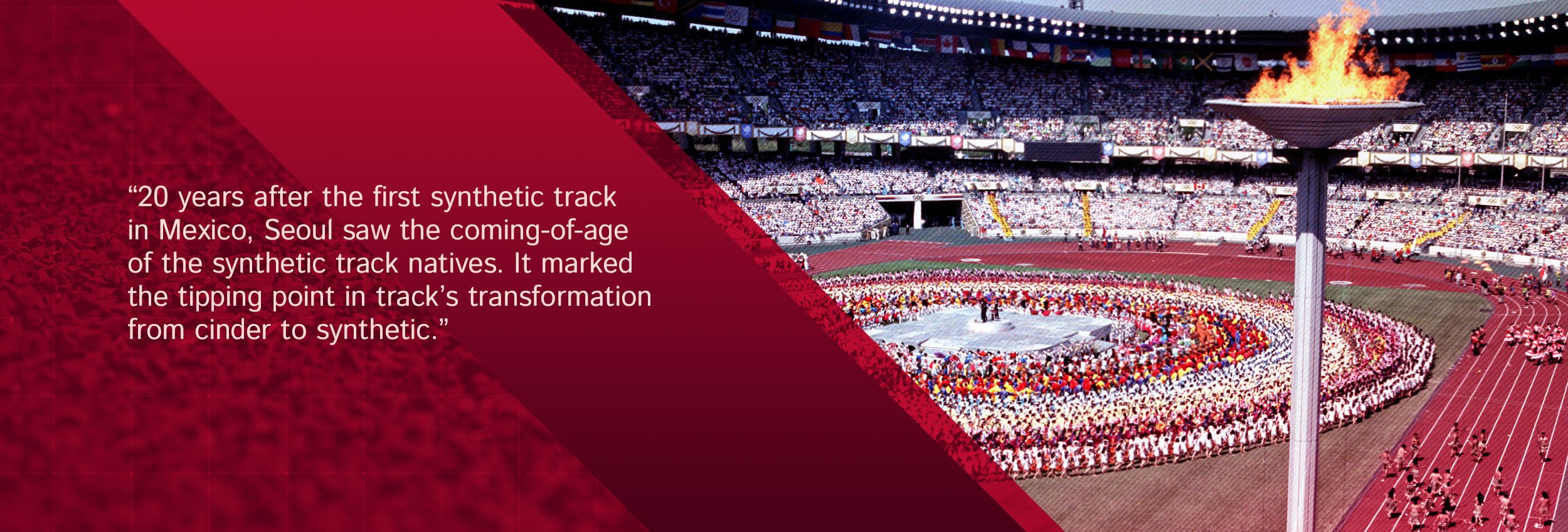The 1988 Seoul Olympics on Rekortan
More records than any of the following Olympics
The most Olympic Records
Sport Group tracks have the most Olympic records. The 1988 Seoul Olympics, run on a Rekortan track, was a standout year that saw a record explosion.
Seoul: A Breakthrough Games
The Seoul Games witnessed more Track and Field Olympic Records fall than at any of the Olympic editions that followed it. Excluding Field events, 24 records were smashed in the Track events alone which is higher than the records broken for Track and Field at any subsequent Games.
In terms of total records set during the modern era, it came second only to the legendary 1968 Games in Mexico which marked the first Olympics to move from a cinder to a synthetic track. Held at altitude, the Mexico Games gave the jumpers and throwers a natural advantage as well as the athletes who had trained at altitude.
“The Seoul Games witnessed more Track and Field Olympic Records fall than at any of the Olympic editions that followed it.”
Credit: PA Images / Alamy Stock Photo
Flo Jo set 100m and 200m track records
Florence Griffith Joyner, or Flo Jo as the world knew her, was the uncontested star of Seoul. Crossing the line in 10.54, she took the 100m Gold and World Record, 0.30 seconds ahead of Evelyn Ashford.
Over the course of the 200m, she set an Olympic Record in the quarter-final and two World Records – one in the semi-final which she then beat by 0.22 seconds in the final with a time of 21.34. Her 200m time of 21.34 seconds remains the current World Record and her 100m Olympic Record set in Seoul stood until Tokyo2020 when Elaine Thompson bettered it by just 0.01seconds in the finals.
She went on to claim a further Gold and Silver medal in the 4 x 100m and 4 x 400m relays respectively in a spectacular haul.
An unexpected twist in the men’s 100m: Lewis and Johnson
In one of the sport’s most infamous races, Carl Lewis took the men’s 100m Gold and a World Record in 9.92 despite crossing the line second behind Ben Johnson who was later stripped of his win for doping offences.
Kingdom Hurdles and Joyner-Kersee Leaps to more US records
Roger Kingdom took two Olympic Records in the 110m hurdles quarter-finals and finals, striking Gold with 12.98.
His US team mate, Jackie Joyner-Kersee leapt to an Olympic record of 7.40m in the long jump (beating her earlier 7.27m OR in the qualifier), and scored a still-standing World Record in the heptathlon with 7,291 points. She was the first American Woman in history to take Olympic Gold in either event.
Jackie Joyner-Kersee. Credit: PCN Photography / Alamy Stock Photo
The Seoul Phenomenon: A Track Transformation
There have been key moments throughout sporting history that have raised the bar forever; from Dick Fosbury’s invention of the Fosbury Flop in 1968, to Jean Vuarnet’s use of metal skis at the 1960 Winter Olympics, to the advent of the first synthetic hockey turf (AstroTurf) at the Montreal Games in 1976.
The phenomenal athletes in 1988 had one thing in common. They were the first generation to have trained for the majority of their careers on a synthetic track. 20 years after the first synthetic track in Mexico, Seoul saw the coming-of-age of the synthetic track natives. With a career spent on better tracks, they were at their peak and ready to smash the old records. It marked the tipping point in track’s transformation from cinder to synthetic. Rekortan tracks were at the foundation of this breakthrough moment and remain the most decorated Olympic tracks in history.

